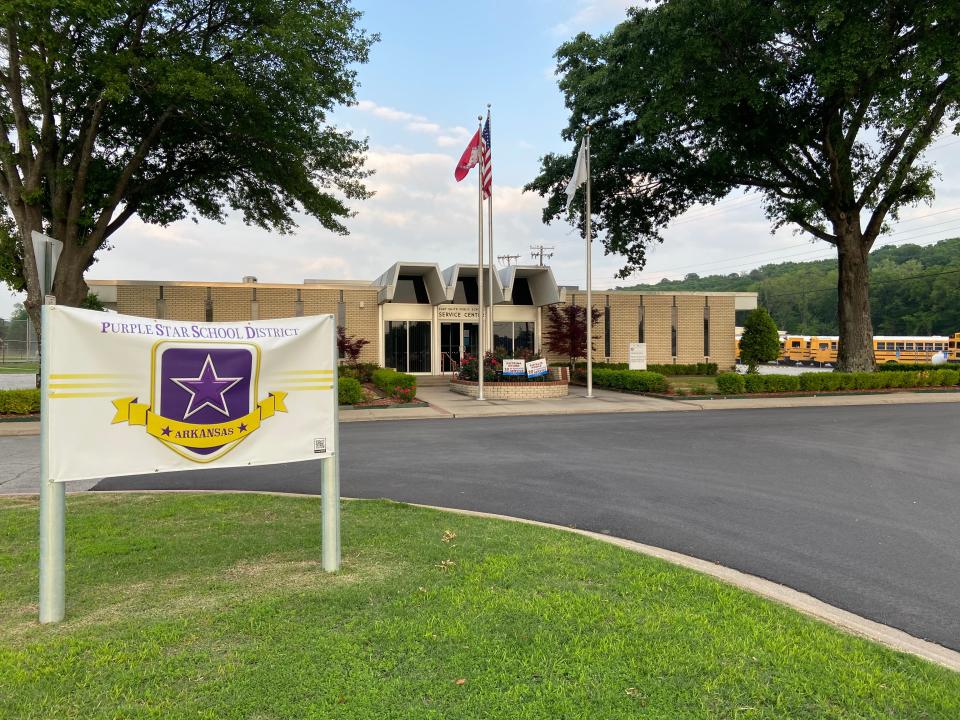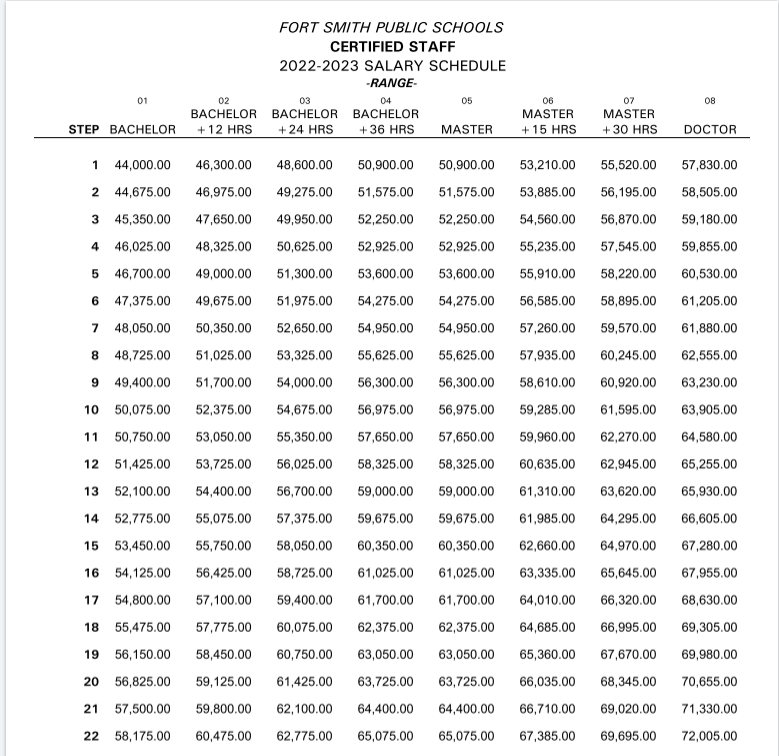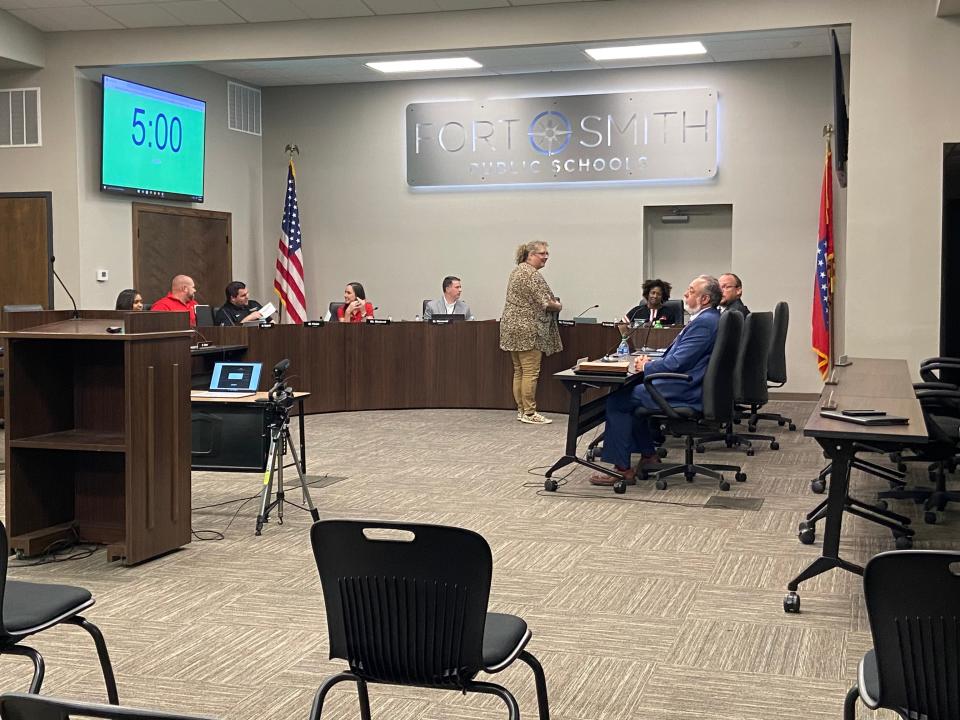Fort Smith Public Schools approves new teacher salaries
New salary schedules were approved at the Fort Smith Public Schools meeting Monday.
The vote was 5-2 for the raises with Troy Eckelhoff and Matt Blaylock voting against.
The district's chief financial officer Charles Warren presented the proposed salary schedule for the 2022-2023 school year.
At the last meeting on April 18, the board heard another presentation about the restructuring of the certified salary schedule. The now revised schedule addresses the concerns discussed on April 18.

The revision specifically adds what is called a "step 22" for all salary lanes for $675. The $675 is the proposed step increase built into the restructure salary schedule for all steps. The new Step 22 is calculated with the same, consistent $675 fixed amount and extends to teachers who have been with the district for 22 years or more.
The revised certified salary schedule provides an average increase in pay of $3,471.81 (or 5.89%).

Before this new salary schedule was presented, the board heard from community members during the public forum time.
The first speaker was Christopher Rink, a former teacher and administrator.
He spoke about how Fort Smith was considered a guide to best practice in regard to teacher salaries.
He also noted that through his hiring process and starting out in the district, he found out that FSPS is also well known for having "cushy jobs" that have little responsibility.
However, Rink said that these positions aligned with teacher salaries and showed that district staff was valued with percentage raises that coincided with similarly fair percentage raises for teachers.
"But times change, people change," he said. "The best practices changed in my opinion. Recently, as you all are aware, the superintendent received a hefty salary increase of 14% over his contract in 2020. While that increase may have been part of contract language, which is what I understand, that percentage increase is highly inconsistent compared to the way teachers have been given raises throughout the same period, which is basically nonexistent."
Rink said he was there to highlight the amount of waste that continues to grow within the district office itself, that has been happening for "decades."
In his research, Rink compared FSPS to Fayetteville and Pulaski special school districts. One thing he noticed right away was that the FSPS district has at least 25 positions that pay over $100,000 a year. There were also 30 positions that paid over $90,000, while Fayetteville has 24 and Pulaski has 22.
Rink calculated that these positions made up $4.75 million from directors and superintendents on salary and benefits.
"There's literally departments that have executive directors and directors and assistant directors all in line with one another, all basically doing the same job," he said. "That's the waste that I'm referring to here."
Rink concluded in saying that the district should not be putting any more money into these office positions than it absolutely needs to, especially at the detriment of teacher salaries.
"I'm here today to ask the board, the superintendent, Mr. Beckham, all of you with an assistant to really take a hard look at where that money is going specifically regarding the district office operations," he said. "Because as we all know, they're not the frontline. They're not responsible for educating our students."

Heather Aguilar, an 18-year teacher and a member of the Fort Smith Education Association spoke to the board next.
She started out by reminding the board that the last time she spoke during a public forum, she presented the members with facts on how other school districts in the area have improved teacher pay overtime.
Aguilar said she had also previously given information about how teachers leave the profession within their first five years.
"I've been looking at the new proposal, now it feels personal," she said. "Let me explain. I'll be here, step 19, with a master's degree, I will get $800 a year, or $33.33 a paycheck before taxes within the new proposal. The new step 22 that's being proposed is a raise of $1,300. So someone that's worked in the district 22 plus years will now get a raise of $1,300, that's $54 a pay period before tax. This is not enough to cover inflation."
Aguilar went on to note that their insurance costs are going up as well. A second year teacher, she said, will make $258.33 more a pay period.
She compared a second year teacher's lack of necessity to spend hundreds of dollars on a classroom library, clothing and other classroom supplies.
"They're still new to the district," Aguilar said. "They're still new to the profession. The second year teachers aren't being asked to be on committees that meet after contract time for no pay, because they haven't been with the district long enough. When administration needs leadership teams or coalitions, they call on the veteran teachers."
She said the district's optics are "embarrassing." The community has seen the 14.47% raise go to "the chop," they have seen over 12% go to new teachers, and 2% or less go to veteran teachers.
"We did not go viral on social media just because of a pen," Aguilar said. "We have 14.5 million to allocate. It needs to be allocated more barely for our veteran teachers."
Aguilar recalled having many veteran teachers talk to her about the importance of retirement when she first started her teaching career. The teachers told her that even though she wasn't starting out at a high pay rate, she would end with one which would help with retirement.
"This plan will not help veteran teachers' retirement," she said. "We have plenty of time to be competitive. We have the money to give an equitable raise right now across the board. Everyone has their eyes on you, and they're going to see how you're going to treat the veteran teachers of Fort Smith. In the words of social media, Fort Smith Public Schools, do better."
Board member Dalton Person had many questions for Warren about the new salary schedule.
"Is this the largest one time investment in teacher pay in the history of the district?" Person asked.
"I think it's a logical conclusion to reach mathematically," Warren said. "I just don't see how there could be circumstances that would allow that type of dollar value being approached only to salary and benefits. It doesn't mean that I can't be proven wrong, but I feel confident that that is a very reasonable conclusion to reach."
Person also asked when the last time a step had been added to the certified teacher salary schedule.
Warren said he was able to find the last time being 1998 when it listed 21 steps.
The one-time federal retention payment of $1,500 was not included in the $4.5 million utilized to restructure the salary schedule.
Person asked if it was fair to say that the new proposal presented in total includes approximately $5.5 million.
Warren agreed that yes, that was a fair conclusion.
A question came from board member Dee Blackwell about why this change is able to happen now.
Warren said that "this is a unique moment." The opportunity came about through unfortunate events over the last two years in which the district was not comfortable putting any salary schedule base.
This meant the district had to live with the current system as it existed. Because of its flawed structure, the district did not want to "add a flawed product" Warren said.
But this year, the district has had correction to its factors and actual assessment growth better than they've seen in the last couple of years. Warren said they actually had foundation funding increase.
The district has also seen enrollment numbers go up.
"I would say that 'Why now?' is the unique nature of two years of inability to do anything all cumulating with one year where we have real positive growth that kind of made up for those two years of nothing," Warren said.
Board member Talicia Richardson spoke about moving forward with this plan so that the district can continue to improve.
"What would be the plans with 2023, 2024, knowing that this is a big step where someone needs to make a decision to stop kicking the can," she said. "What can we do to not stop here? With the market, with inflation, cost of living, everyone who owns a business right now is trying to figure out how am I going to make it. So what can we do as a district to start funding for that now? Because again, we talked about this at the last board meeting, that there's no guarantee that our enrollment is going to continue to increase."
Richardson also asked about the number of retirements the district is seeing and how that could possible free up funding for new salaries to have a higher rate.
"We've not seen a market increase in what we have historically seen as far as that type of retirement and new hires," Warren said. "It was part of an internalized calculation because a lot of things, there's still costs to classified employees that we're not talking about for those that are just moving up that rescale themselves. So that's already factored in."
Superintendent Terry Morawski said he would like to focus on future goals and evaluate their compensation strategy.
"I'd like to look at because every year it seems like this is a new discussion," he said. "I'd like there to be planning ahead. It helps us in planning, it helps people to know what to expect. If we can set those targets and then every year we're working on those targets."
Morawski said he wants to look at adding additional steps to the salary schedule and add to the base pay, which impacts the entire schedule.
"Not only starting salary, but also getting closer to big goals," he said. "Again, I think it needs to be a larger discussion and just my opinion, but we have that discussion moving forward and then every year we can hammer away at those goals as opposed to having a brand new discussion about salary."
Richardson wrapped up her commentary with two points: how can we minimize teacher's out-of-pocket costs, how can we make sure they get tax credits for these expenses and make this beneficial?
Person asked Warren why their base salary is still ranked the lowest in Arkansas.
Warren said it's because of the push for raising veterans' salaries each year. This takes away from starting teachers' salaries and creates a big gap between them and the veteran teachers.
Person agree that the board had to move forward and restructure their current salary schedule, or the disparity between pay rates would continue.
"What gives me heartache and keeps me up is that it just comes to the most mental impact at our most veteran teachers," he said. "And that's what I hate about this. I'm hopeful this can be a long term solution simply such that in the years that follow, we can continue to add steps. And that we can simply add a percentage to the base each year, and I think that we will be able to avoid that huge disparity. It's a matter of someone's got to make that difficult decision and it's unfortunate that it comes at this time and to the potential detriment of our veteran teachers. But that's why we're here."
This article originally appeared on Fort Smith Times Record: FSPS approves a new salary schedule for 2022-2023 school year

